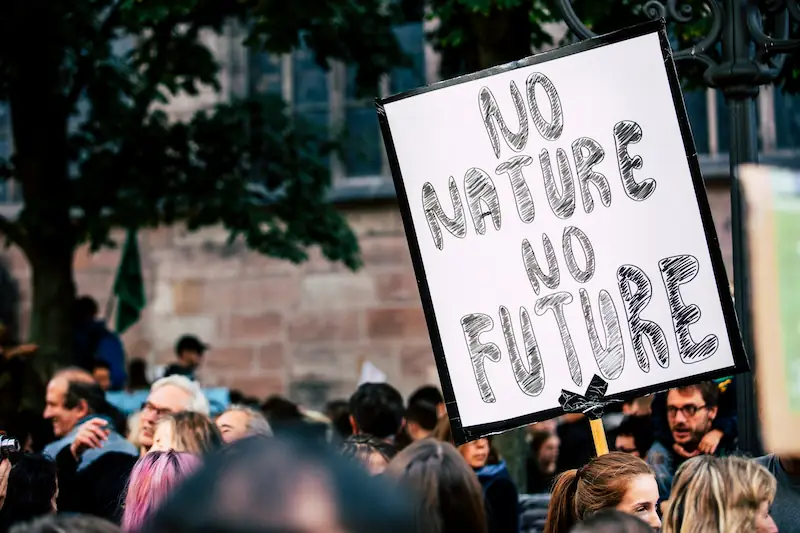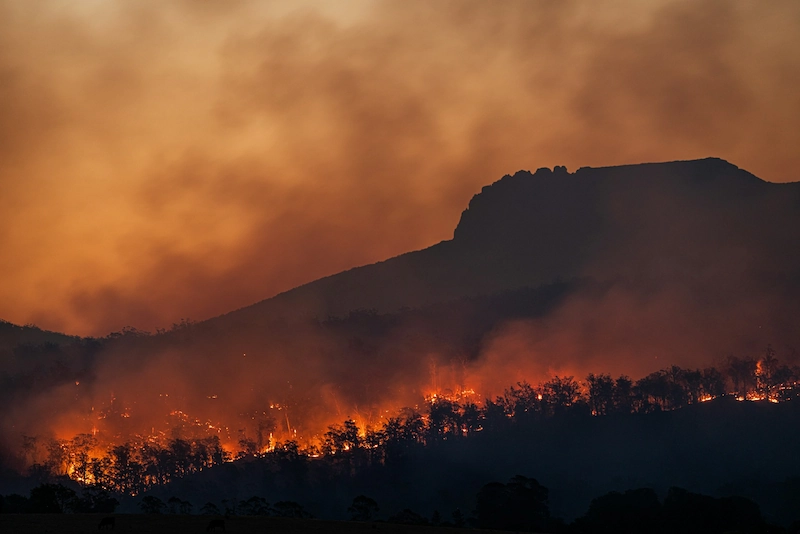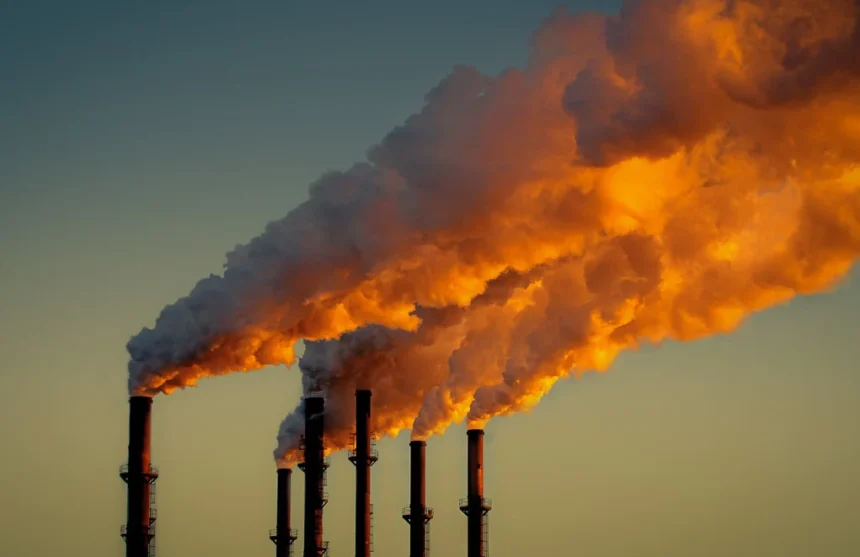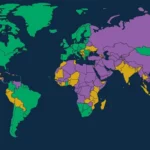About the book End of the World: Civilization and its Fate, by Jon Mills. Published by Rowman & Littlefield in 2024.
Extreme climate change and the despoliation of our planet. Threats of global war and nuclear annihilation. Vast social implosions and human misery. Terror, nuclear armament, world overpopulation, major weather disasters, global warming, pandemic health crises, water scarcity, food shortage, techno-nihilism and obscene wealth disparities threaten universal security.
What shall we expect next? How do we understand widespread failure to properly ameliorate the emergency our world faces? Is civilization destined for self-annihilation?
Dearth and human angst will likely motivate mass panic and brutality under the so-called influence of social Darwinism.
Given that we see the decay, destruction and impending risks of possible extinction looming before our very eyes, and yet continue to fail to make any meaningful progress toward international unity, the fate of humanity appears to be under the sway of a global bystander disorder.
As we idly stand by in the face of possible ecological, economic and societal collapse, we must seriously question whether humankind is under the sway of a collective unconscious death wish.
The Overpopulation Dilemma
The world population is now eight billion people, growing by two billion over the past two decades alone. Following this unprecedented growth, it is estimated there will be more than ten billion people worldwide by 2050. Most scientists believe that the Earth will not be able to sustain that many people, and if it is possible, not without grave consequences.

The mass consumption of resources will likely be too taxing to support the plenitude of food required, which takes most of our water supplies and fertile Earth’s surface to grow. With our world economies in a state of tumult, the availability, price and affordability of basic human requirements for sustenance—water, food, shelter, and energy (e.g., electricity and heat)—are in flux.
Much of humanity is driven more by fears and prejudice than by rational analysis.
Furthermore, compounded by unforgiving climate change, mass industrial and environmental pollution has severely limited the availability of potable water around the world. Hence, the paucity of clean drinking water has become an urgent ecological and humanitarian crisis. Imagine what it will be like with billions more people crowding the planet, all vying for the basic necessities of life.
As our world warms, as the size of the global population balloons, and as the planet becomes even more overcrowded, there will be more scarcity, competition for resources, ruthlessness and a lower quality of life overall. Dearth and human angst will likely motivate mass panic and brutality under the so-called influence of social Darwinism, which will predictably lead to more human tensions, exploitation, war and suffering.
In the face of these challenges, we will likely devolve into primitive desperation where the ability to consider the lives of others will be eclipsed by the need for immediate benefit and tribal survival, even if that means we abandon a moral stance toward our fellow human beings. This is as predictable as death or taxes.
We Can’t Hide
No longer can we pretend that everything is fine as long as “We,” in our sheltered, privileged Western lives, remain unscathed or untouched by the events that transpire around us.
Politics is inherently corrupt without a watchtower ensuring that human exploitation is curbed.
Security is increasingly an illusion: As we experience greater economic and social disparities worldwide, leading to concentrated pockets of civil protest, disobedience, and mayhem, as we currently see in Eastern Europe, the Middle East, Africa, Central and South America, Asia and North America, every nation feels the threat to universal well-being but also safety at home.
And enemies don’t just come from the outside. Conflict is generated from within a society where economic and class discrepancies, racial division, religious intolerance, political injustices and governmental mistreatment of collectives lead to societal dissent, uprisings, riots, coups and rampages.
The Roots of Internal Conflict: Fear, Prejudice, and Power
Because much of humanity is driven more by fears and prejudice than by rational analysis, we are guided by our primal desires, conflicts and complexes. This is equally true of nations, states and superpowers, where politics serve to manipulate people’s minds and vulnerabilities in support of the self-interests of those sailing the ship. This is human nature, for man is a political animal. However, politics is inherently corrupt without a watchtower ensuring that human exploitation is curbed.
Through our continued maltreatment and sullying of the Earth, we are slowly committing global suicide.
Even within well-meaning democracies, citizens are complicit with national policies, laws and actions that mistreat opposing nations and groups without provocation. Silence merely condones the deeds of their nation’s leaders. And when other countries are harmed by a superpower, the backlash is violence. Political injustice and social exploitation predictably lead to civil disobedience, bloodshed, insurrections and rebellions. When an individual, community or nation is done wrong, even if it is only perceived, the toll is resentment and the need for revenge.
We can’t hide from the religious chauvinism that threatens our security as well. Tribal warfare in the Middle East is perhaps one of the greatest threats to global stability, where Armageddon and messianic holy wars are manufactured by psychopathic leaders in the name of God, affecting everything from air travel and tourism to border crossings, national security, counterintelligence and unbridled global surveillance. Meanwhile, Christendom in America interferes with civil liberties and tries to condition how government should view education, morality, health care and private affairs.
The New Apocalypse
The four horsemen of the apocalypse—conquest, war, famine, and death—have been replaced by global pollution and climate change, rapid proliferation in the world population, shrinkage in natural resources, terrorism, technological hubris and risk (e.g., generative AI and disinformation campaigns), economic corruption and squandering, and the hegemony of political power.

The future that these calamities portend requires that we deal with our global problems expeditiously. Will humanity avail itself to subvert its selfish and aggressive propensities toward self-annihilation? Knowing that the world is going down the pea patch in a hurry, how ought we to live?
Through our continued maltreatment and sullying of the Earth, we are slowly committing global suicide. Like a sadomasochist or a drug addict, we know that we are hurting ourselves, yet it just doesn’t move us to action. Is this due to apathy, an eclipse of empathy, and/or a failure to take responsibility for our self-destructive deeds? Or is this a crass defense, the momentary dismissal of reality for the more immediate desire to consume and gratify our pleasures and whims?
Will humanity find ways to limit carbon emissions, protect nature, and thrive?
Our pursuit of immediate satisfaction overrides the rational necessity to delay gratification and secure more healthy parameters for future enjoyment. But also, humanity is so immersed in its own immediate presence that it cannot fathom a future absence.
I suggest that this is largely attributed to an omnipotent grandiose denial: Collective humanity simply will not entertain the sobering truth of such foreseeable catastrophic risks to our continued survival. Unconscious wish fulfillment is so strong that the need to believe in a future that for all practical purposes will go on forever is delusional: It is only on the condition that we suspend empirical evidence that we can go on living in denial. These fantasies fly in the face of reality, for we cannot negate the fact that we are incrementally killing ourselves.
Envisioning Alternative Moral Futures
These observations lead us to the conclusion that our immediate concerns and desires we fulfill in the present are more important than the future, and that of our own children’s and grandchildren’s future, a rather myopic form of selfishness indeed. We have failed to contemplate the ethical and have not held sacred the covenant we have pledged toward respecting and preserving our earthly alma mater, the nurturing ground of our existence, without which we will no longer sustain life.
As the cataclysmic decay of civilization through ecocide and self-obliteration is looming, the failure of collective rationality, guilt, shame, and ethical rectitude to act has devolved into its own pathos, the ignorance and inertia of self-consciousness, our moral day of reckoning—social Armageddon. In the wake of all knowledge, we continue to conquer, consume, exploit and kill. This is humanity’s death drive.
But can there be an overcoming and reversal of such corrosive processes, to devastate the devastation we have caused? Can we create a clearing that opens a prospect to heal our abject colonization of Being? Can we recover and repair such world alienation and undo our ontological crisis by reshaping the culture that has given rise to it?
The End of Civilization—Or Is It?
The end of civilization is not a preordained fatalism but will, rather, be an imprudent consequence of our cavalier and dismissive hubris of our own unconscious tendencies toward self-eradication, that is, humanity’s death wish that will cause our extinction if we don’t wake up from our dream world and stop it from becoming real.
Let us ask: What will it take to save the world? The first thing we must do is to break out of our denial and stop lying to ourselves. We cannot continue to destroy the environment and fail to remediate carbon emissions and pollution without destroying ourselves.
No amount of deceit, cleverness, or magical thinking will bring about a better future. This will take honesty, policy reform, social activism and deliberate, concrete political change at local, state, and national levels. We must all get involved in our own ways, but educating the public, corporate industry, private business, and electing conscientious leaders into political office is a first step forward. Those who resist acknowledging and addressing our planetary emergency are a liability to actualizing tangible solutions.
Humanity’s Role in Renewal and Conservation
Besides working in partnership to conserve the planet, its ecosystems, species, and wildlife, can we make a case for renewal? Visionary futurists believe we already have the technology to reverse climate change, feed a larger world population, provide energy for all, wean off fossil fuels, and prevent most extinctions. But given that biodiversity has deteriorated at a faster rate than any time in human history, nature needs us to act now. Through increased habitat loss and overexploitation, on land and sea, the biosphere could collapse. If biodiversity disappears, so will we.
The solution: Protect more lands and oceans and manage them for their conservation values.
The reality: Resistance, denial, and pushback prevent policy change, legislation reform, and political decision. Although many conservation groups and stakeholders are involved in campaigns for nature, nothing will likely change unless policy makers and government leaders take action to combat nation-centric and capitalist-corporate self-interest causing and sustaining biodiversity abuse and loss.
The bottom line may simply be about introducing financial incentives and penalties in order to spur on large-scale transformations in values.
Even though life will be warmer in the future, the question becomes: Will humanity find ways to limit carbon emissions, protect nature, and thrive? When like-minded stewards of the Earth start to challenge the reckless pursuit of corporate profits that fail to consider the well-being of the planet, which they consider to be a crime, companies and politicians alike will be increasingly pressured to assume greater responsibilities toward our world.
As our biggest shared challenge is climate change, as individuals we cannot stop it. The popular and political will behind collective efforts needs to be mobilized to adopt new green policies and laws that force societies to change, adapt, and use new technologies toward achieving practical and meaningful goals of landscape restoration and climate justice, mitigation, amelioration, and sustainment.
We are all responsible to contribute to viable solutions in our own way. It’s time to start having honest conversations with those around us—our family, friends, employers, government representatives, and NGOs who can persuade the will of the public to pursue alternative moral futures in order to pull us back from the brink of extinction.









